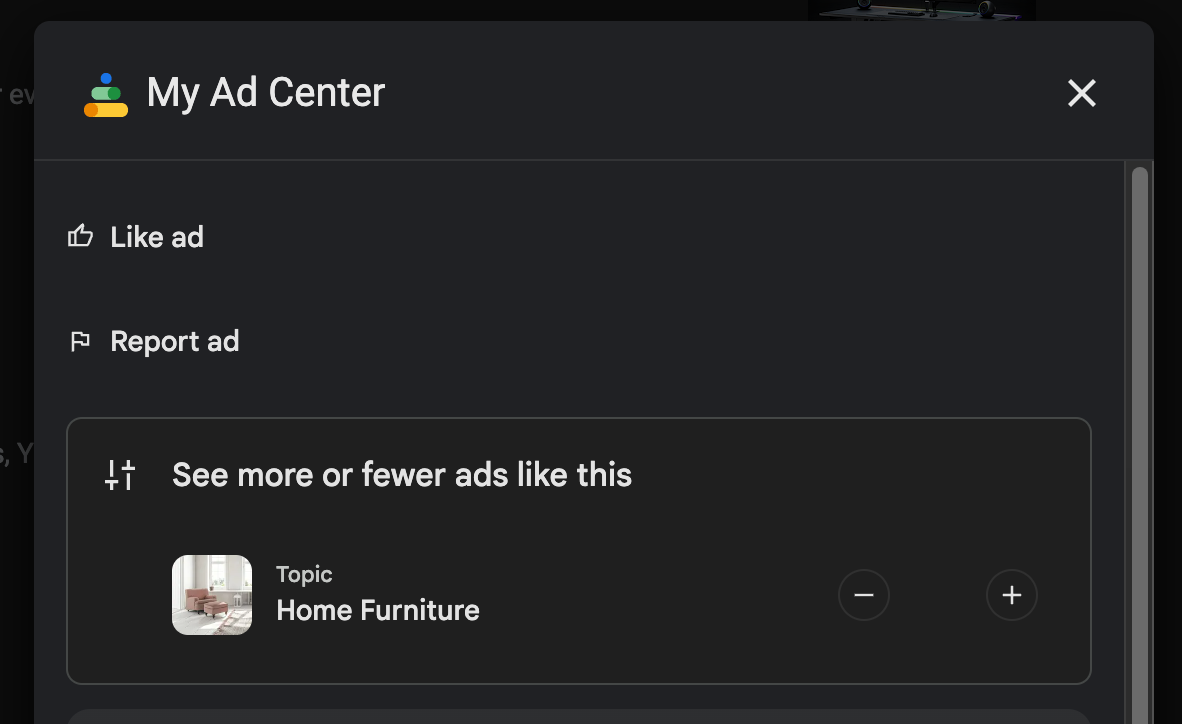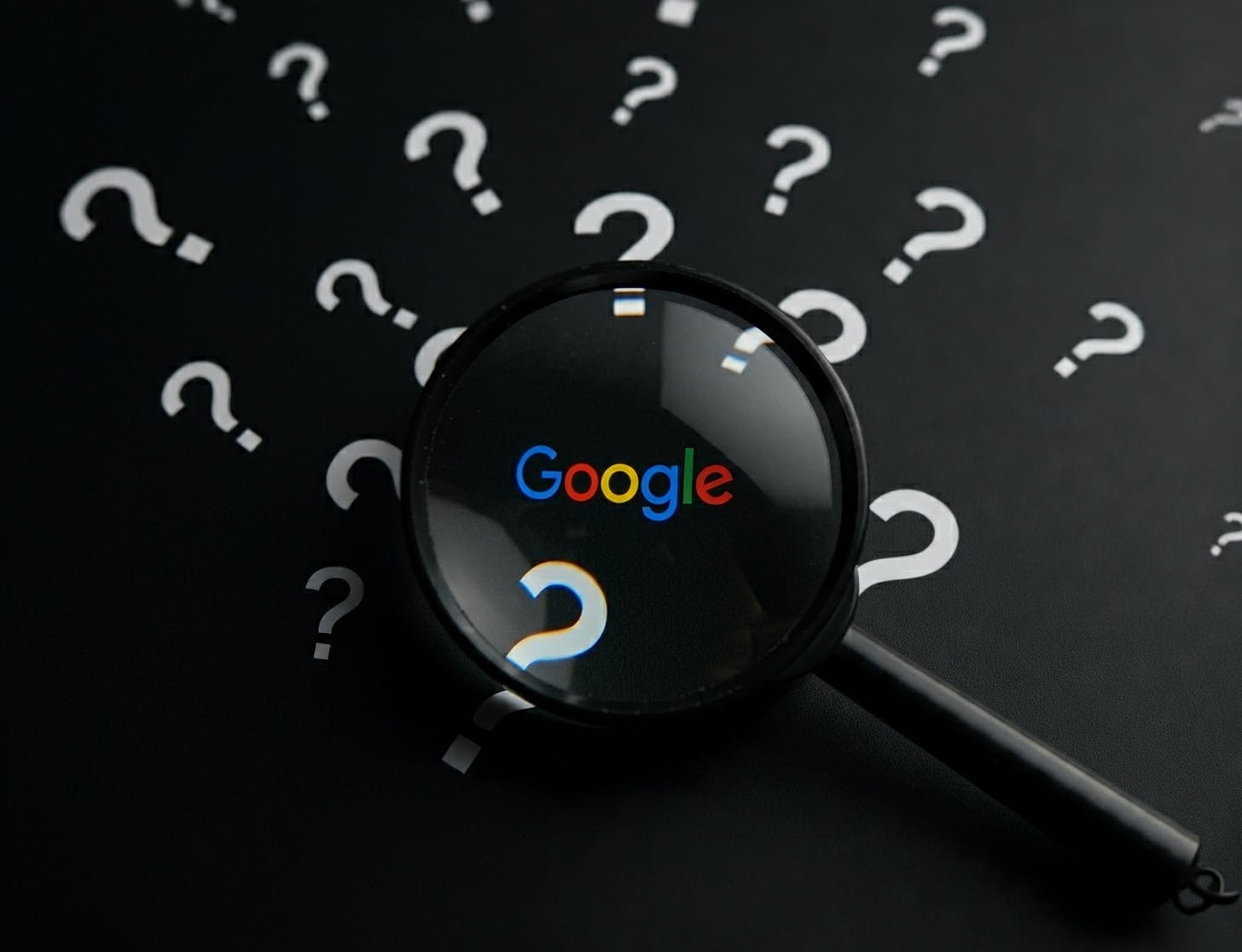A Technical Perspective: Has Google Search Gotten Worse?
Providing a technical perspective for a more educated assessment of a complaint I hear quite frequently
tl;dr: The organic Google Search and Google Search Ads feeds create two separate search feeds with results Google thinks the user will like. Having two separate feeds allows each feed to overcome the weaknesses of the other. This only works when both the search and ads serving algorithms work well and is why both are run by sophisticated machine learning systems that are developed continually.
I’ve seen a lot of hate toward Google search recently. Posts all over both Twitter and YouTube complain about the quality of Google search having gone down and the general user experience having deteriorated. I know a lot of people who have switched to DuckDuckGo or Perplexity (which I think is an entirely different tool, but that’s for another time) for their search needs.
Mrwhosetheboss recently released a video about this called “Why Google Search is Falling Apart”. It was a very well researched video (I recommend watching it), but I as I was watching it I realized the lack of technical understanding the general user has about Google Search and Google Search Ads even at a high level.
Google Search combined with its ads is one of the most sophisticated group of machine learning systems in the world. I think having a general grasp of the technical components of the system can help educate one’s perspective regarding Google Search and how it works. As someone who works on the machine learning side of the Google Ads behemoth, I figured I would share my perspective.
To clarify: The purpose of this article is not to say the complainers are wrong. In fact, they’re probably correct. I’m a huge proponent of user-focused software1. The goal for all software should be improving the user experience and if the user doesn’t think that goal is achieved then the software is lacking. Instead, I hope my perspective can clarify some of the technical complexities behind the complaints users have.
I’m going to address two aspects of Google search I see complained about most:
Google Search is terrible.
Google Search Ads are unbearable.
To be completely transparent: While I’m going to try to write this article bias-free, I am a bit biased in favor of Google. I’m not biased because I work on these systems—I work on these systems because of this bias. In other words, I wouldn’t have accepted a job working on Google Ads if I didn’t look upon them favorably.
Google Search Results Aren’t Good Anymore
I think this aspect of Google Search was covered really well by Mrwhosetheboss, but I’ll reiterate it here.
At a really high level, Google Search works by crawling the web pages of the internet, indexing them (or storing them), and serving them to users based on user queries (search terms). The system uses machine learning to match the search query to the appropriate web pages.
Just like human-driven decision making, there are many factors that go into the decision Google Search makes regarding the web pages to show a user. Some of these factors are related to the user such as the search terms or browsing session. Some of these factors are derived from the webpages Google has indexed.

This is where search engine optimization (SEO) comes into play. The is the process of optimizing a website to maximize its chance of being served high in search results. This includes manipulating the factors Google Search looks for within a website to rank it highly. Essentially, webpage designers can game Google’s search algorithm to rank highly for searches even when their website might not be the most beneficial to the end user. As Mrwhosetheboss mentioned, this can lead to Google search serving scam, low-effort, and even off-topic websites over quality websites simply because the worse websites have better SEO.
Clearly, this isn’t ideal for users or for Google. So how does Google counteract it? By switching the factors that contribute to rankings that are optimized to improve a website’s SEO. Google has to switch these factors so SEO can’t be gamed but they have to do so without affecting the effectiveness of the search results for the end user.
And that is the tough part. Essentially, the search team needs to constantly change and improve the search algorithm enough to minimize SEO spam while not worsening search results. Add that machine learning algorithms fundamentally lack interpretability and we can see that this task is very difficult.
This isn’t a problem unique to Google—all search engines have to deal with it and it’s important to understand that it may cause the search engine’s performance to vary over time. If you feel like it’s a constant problem, it might be worth checking out another search engine or different search experience like Perplexity or Gemini.
This is something I do quite often and it’s helped me gain a better understanding of the pros and cons of different search tools. This has been especially interesting now that LLM-based search tools are competitive.
Google Ads Have Ruined the Search Experience
This is where my opinion diverges most from the majority. I think Search Ads done right are a net positive for all parties.
Most people look upon ads unfavorably because they’re an attempt to manipulate a user’s internet behavior so they spend money. This has caused internet ads to lose favor as they can be deceptive and intrusive—especially when used in overabundance.
This is absolutely correct for ads that are done incorrectly. I see this all the time with websites that spam display ads. There are usually ads on all sides of the “content” (in quotes because the content also may or may not be an ad itself) and an unskippable video ad that covers half of the screen. These only get worse when the ad isn’t relevant to the user and when it makes the webpage load slowly.
I think Search Ads are in an interesting spot because they don’t need to degrade the user experience. The goal of Search Ads is to use machine learning to maximize the benefit from the ads for three different parties: the advertiser, Google, and the user.
You might be rolling your eyes because this seems impossible and that’s partially true. Maximizing value for a single party seems at opposition with maximizing value for the others. This is an incredibly difficult task that must be fulfilled for Search Ads to work properly.
For Search Ads to work, a user must want to click an ad and the user must provide enough value to the advertiser so the advertiser wants to pay for the click. If these two things don’t happen, users won’t use Google because they’re unhappy and advertisers won’t use Google because they’re unhappy which makes Google unhappy.

Machine learning is what allows Google to ensure Search Ads works for everyone. It’s quickly becoming the method to solve hard technical problems and Search Ads is a great example of why.
Properly done, Search Ads should create a second search feed for the user. While this search feed will be influenced by advertiser spending, it should also be free from the downfalls of the organic search feed by removing untrustworthy search results and the negative impact of SEO.
Thus, Search Ads, when done properly, create a second search feed for the user. Google Search then shows:
An organic search feed that utilizes SEO to rank and serve pages.
An ads feed that substitutes the downsides of SEO ranking with advertising spending and more effective removal of scam websites.
This is beneficial:
For the user by providing a second, relevant search feed.
For the advertiser by only serving ads that a user will want to click.
For Google by monetizing Google Search.
However, this is only when ads are served correctly. Improperly served ads at best create a terrible browsing experience and at worst become a privacy nightmare. I understand that a lot of people feel Search Ads to be a poor experience and Search Ads definitely aren’t perfect. There are many times benefit for all parties can’t be achieved by serving ads and that’s why there are many searches with zero ads served.
If you do see irrelevant ads make it known. Irrelevant ads ruin the “second feed” experience of Search Ads and they’re taken seriously. When inappropriate ads are reported emails are sent directly to engineering teams to get it taken care of. I know because I’m on those email threads. 😊

Tuning ads so they work for everyone is a difficult process that’s constantly ongoing. I’m grateful for this because it means I have an interesting job where I can make an impact.
Again, this post isn’t meant to rebut any criticisms of Google Search or Search Ads. It’s meant to provide some technical context of the systems that contribute to the user experience. Let me know what you think! I’d love to discuss this.
Thanks for reading!
Always be (machine) learning,
Logan
You might think being a proponent of user-focused software is common sense but there are a surprising number of systems and software engineers that don’t build to optimize for the user.





Great post! Reminds me of a Freakonomics podcast episode a while back. One of the guests said "Is Google search getting worse, or is it the internet that is getting worse?"
Google's success means people tend to create content for Google rather than for an audience. That content is often garbage. I'm writing a post about how this affects the training data available for AI.
Interesting opinion Logan. Curious when you say search has to change factors continuously to counter scams, does that mean it has to utilize new features to know about the new kinds of scams ? Or do you mean change the ranking function entirely ?